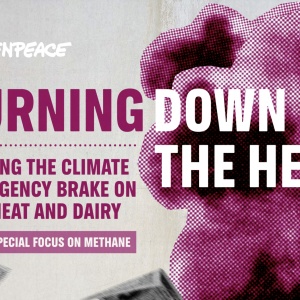
This report from Greenpeace finds that the meat and dairy industry would add 0.32 degrees of additional global warming from 2015 to 2050, with methane responsible for three quarters of this. Scientists predict that each 0.3°C warming we prevent by the end of the century could reduce exposure to extreme heat for 410 million people.
Publisher’s Summary
The meat and dairy industry is sitting on a big dirty secret: its massive methane emissions. Between 1910 and 2015, there was an enormous increase in both the production and consumption of meat and dairy. Livestock is the single biggest source of human-made methane. Reducing methane associated with meat and dairy is therefore a critical lever that will influence how quickly or slowly the world heats up in the near-term. Cutting large amounts of methane through a prompt transformation of our meat and dairy sector could be key, together with a fossil fuel phaseout, for an iconic victory against catastrophic climate change.
The increase of livestock production represented one of the most important drivers of emissions increase in the global food system in the last decades. This report shows different pathways we could take between 2025 and 2050 as humanity to either speed up or slow down global heating through the meat and dairy sector, with profound consequences for the survival of millions of human lives and the resilience of all life on Earth.
Modelling the UN FAO’s business as usual scenario for the future of food, our findings show that we would add an additional warming of 0.32°C by 2050 (compared to 2015 levels) from the meat and dairy sector alone (see Section 1 & Figure 2). Methane would be responsible for more than three quarters of this warming (Figure 3). Neglecting prompt action in this sector would mean increasing average global temperatures by an additional 0.16°C as soon as 2030 from meat and dairy expansion alone.
They may seem like small numbers, but when we’re talking about climate change, each fraction of a degree of global warming will impact millions of lives and livelihoods.
Scientists predict that each 0.3°C warming we prevent by the end of the century could reduce exposure to extreme heat for 410 million people. Each 0.1°C of warming we prevent could mean that around 2% less ice mass on global glaciers will melt, significantly improving water availability, reducing sea level rise and flood risks for millions of people in coastal areas.
Reference
Read more here. See also the TABLE explainer, What is agricultural methane?







Post a new comment »